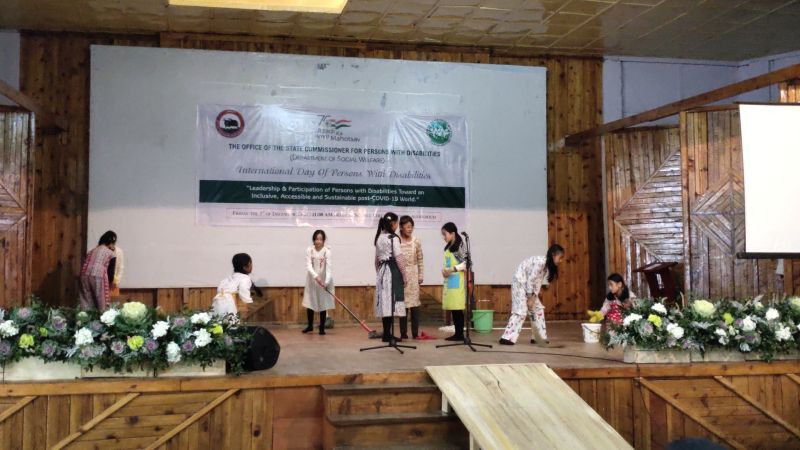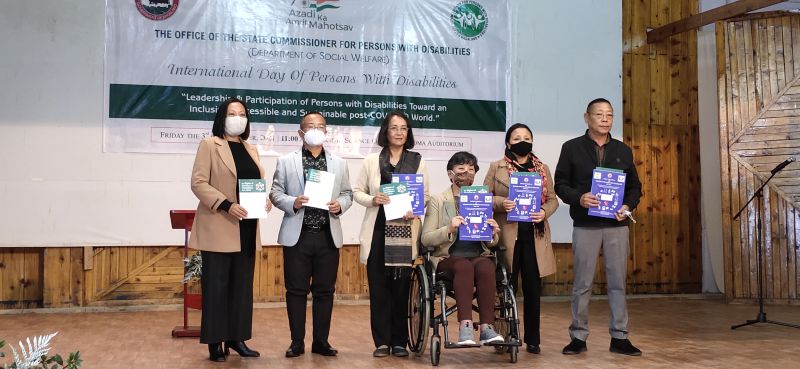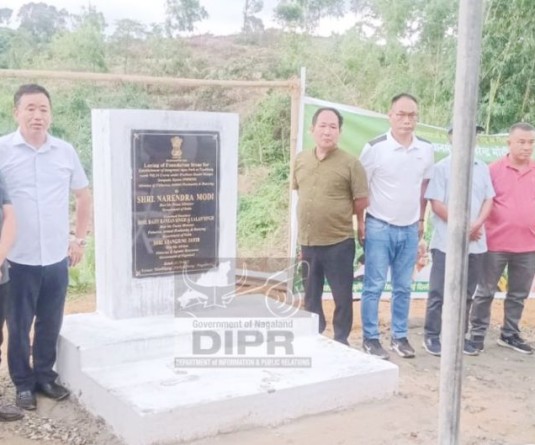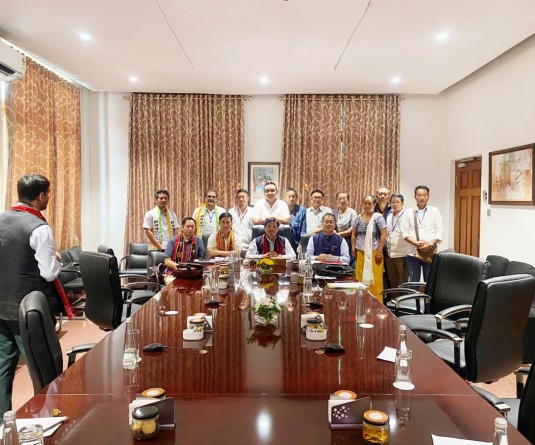students of Jo Foundation Inclusive School, Kohima presenting a play on ‘Its hard knock life’ on the occasion of International Day of Persons with Disabilities on December 3.

Morung Express News
Kohima | December 3
“Enough time has been given, enough excuses have been made. Non-compliance is no longer acceptable” said the Nagaland State Commissioner for Persons with Disabilities, Diethono Nakhro during the observation of the International Day of Persons with Disabilities on December 3.
As the world observed the International Day of Persons with Disabilities, a call was made to the Nagaland Government and society at large to start looking at the issue of disability inclusion seriously.
Nakhro maintained that real accessibility and inclusion will only be achieved through “active consultation with disabled people who have lived experiences, and their representative organisations. Their full participation in decision-making processes must be ensured.”
The pandemic, she stated, is deepening pre-existing inequalities and exposing the extent of exclusion of people who live with disabilities, creating further disadvantage and increasing vulnerability for many disabled people.
“As we emerge into a post-Covid 19 world and chart a course forward, all these need to be systematically addressed with concrete and targeted measures,” she observed.
Promoting inclusion of persons with disabilities include the right to go to school, access to healthcare, to start a family, to be able to participate in sport as well as other leisure activities, to engage in political participation and to have decent work or other income generating opportunities, she said.
“We cannot continue treating inclusion like a side issue which you practice or not as per your convenience even as a large chunk of our population is excluded and left behind,” Nakhro stressed.
Gracing the occasion as the guest of honour, Christine Iralu viewed that this is the day to celebrate those who, despite hurdles and challenges, have broken through to living fruitful lives.
“We should also be mindful of those who need our support, encouragement and help to overcome the obstacles and difficulties they are currently going through” she reminded. “Each of us is required to do our best and give our best in every situation we find ourselves to the best of our ability,” she added.
‘I care for my capability not disability’
“I care less about my disability but care more about my capabilities” said 24 year old Ngaugonbe, a differently abled man.
Narrating his experience of living with disability, he said “we live with them, but they fail to see us.” He pointed out that people like him are often sidelined in society. People, he viewed judge them by their physical appearances and not by their capabilities and potential. “I have been part of the society, but am not part of the society” Ngaugonbe said, adding “I want to be a part of the progress and development happening in society.”
Commissioner and Secretary, Social Welfare Department, Sarah Ritse also spoke during the occasion, while Rodeno Tungoe, a hearing impaired person, expressed that good etiquette begins with inclusion not exclusion.
Interpreters during the event were Ruokuokhrienuo Vizotha, Catherine Thong and Kilumo Ezung.
59% of disabled community are illiterate, finds study
Meanwhile, the lack of data poses a major challenge to formulate any action plan for Persons with Disabilities (PwDs).
Except, for the general statistics in the 2011 Census, there is no specific data relating to PwDs in the state. According to the census, there PwDs population stands at 29,631. (see box)
The office of the State Commissioner for Persons with Disabilities together with the North East Institute of Social Sciences and Research (NEISSR) Dimapur conducted a study to better understand the experiences of the community and to identify some of their specific needs during the pandemic lockdown. The report released today was sampled among 506 PwD participants across 12 districts covering urban/town and rural areas.
Presenting the data, Dr Deben Bachaspatimayun, consultant & visiting faculty, NEISSR, Dimapur informed that hearing impaired was found to be highest with 36% followed by any other with 18% (ascertained by medical testing), visual impaired (15%), locomotor (10%), multiple disabilities and speech (8%), intellectual disability (3%) and mental illness (2%).
The study found out that the literacy rate among PwDs is 41% (male 43% and female 57%), while 59% of the population were illiterate.
Kohima district has the highest rate of literacy followed by Mokokchung and Dimapur while Noklak recorded nil.
Regarding employment sector, 30% of the population are unemployed, 21% are employed while 20% are engaged in self-employment and 29% are still studying.
Among those employed, 55% are working in government sector with 29% in private sector, 9% in religious institutions and 7% working in NGOs. Interestingly, there is not a single PwD either employed or working in the district of Wokha, Tuensang, Phek, Peren, Noklak and Kiphire.
Perhaps, due to lack of awareness, the study found out that not a single person had the disability certification in Wokha, Tuensang and Noklak. With 89%, Mokokchung has the highest number of disability certifications followed by Kohima and Dimapur.
On the awareness of PwD government assisted schemes, Dimapur district has the highest rate of awareness with Longleng in the bottom.
Meanwhile, Churches and NGOs were found to have extended maximum support and help to the community.

Nagaland PwDs Statistics
|
Type of disabilities |
Total workers |
Cultivators |
Agricultural labor |
HHI |
Other workers |
Non-workers |
Total |
|
PwD population |
15,384 |
10,416 |
969 |
375 |
3624 |
14,227 |
29,631 |
|
In seeing |
2264 |
1414 |
155 |
58 |
637 |
1887 |
4151 |
|
In hearing |
5529 |
3897 |
278 |
134 |
1220 |
3411 |
8940 |
|
In speech |
1291 |
954 |
106 |
16 |
215 |
1003 |
2294 |
|
In movement |
1533 |
851 |
95 |
65 |
522 |
2295 |
3828 |
|
Intellectual Disability |
477 |
318 |
46 |
8 |
105 |
773 |
1250 |
|
Mental illness |
344 |
244 |
35 |
7 |
58 |
651 |
995 |
|
Any other |
2708 |
1793 |
159 |
59 |
697 |
2130 |
4838 |
|
Multiple disability |
1238 |
945 |
95 |
28 |
170 |
2098 |
3336 |





